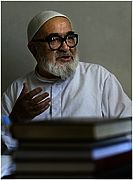Interrogators Are Guilty and Criminals
» Ayatollah Montazeri Tells Rooz:
As executions rise in Iran, RoozOnline spoke with senior ayatollah Montazeri on the subject who stressed that, “there is no religious or legal basis for these judgments.” According to Amnesty International, “in just the last 50 days, some 115 people have been executed in Iran which breaks down to about 2 per day.” Even though Iran has had the second highest executions in the world, this number and status has increased since the June 12 contested presidential elections, and the figures are unprecedented even in the Islamic republic of Iran.
The judgments of death penalty for 5 suspects in the second kangaroo trial session of protestors questioning the elections, were issued despite the declaration by attorneys that these detainees had nothing to do with the post-election events and protests and they had all been arrested prior to the elections turmoil.
In his interview with Rooz, regarding the confessions which have served as the basis for the heavy sentences after the elections, ayatollah Montazeri said, “The confessions that have been extracted in prison have absolutely no religious or legal value and cannot be the basis for the death or prison punishments that have been issued.” According to Montazeri, “those who are responsible and their accomplices for such confessions, are religiously and legally guilty and criminal.”
This highest religious authority in the Qom Theological Center, and a former deputy leader of Iran during ayatollah Khomeini’s early rule also commented on the execution of minors and told Rooz, “Whenever the execution of a religious punishment leads to negative consequences on religion or society, the judge can and must stop the execution.”
The execution of younger-than 18-year old youth in Iran has been a controversial issue in the Islamic republic. And while Iran has officially signed the international convention on the rights of children, which bans executions of minors, such youth have been kept in prisons until they come to the age of 18 after which they have been executed. According to article 37of the convention, the execution of the death penalty for individuals younger than 18 years of age is banned. The Iranian judiciary, on the other hand, references its Islamic penal code which provides for eye-for-an-eye type of punishment and executes those younger than the age of 18.


